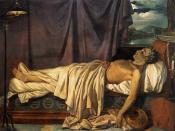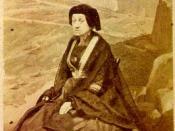'Darkness' is a word which is at the same time both dreadful and evocative. This is the one word Lord Byron chooses as the title for his poem. It is a fitting description of Byron's chilling, but powerful, poem, 'Darkness'. 'Darkness' is a foreboding tale depicting the end of life on earth. Byron's emotional and descriptive diction and imagery create the tone and setting in which the world comes to an end. It is an end most completely embodied in one small passage about a dog, which shows the keen link between Byron and the other Romantic poets.
'Darkness' is begun with the line 'I had a dream, which was not all a dream.' The initial impression struck by the word, 'dream', is one of inconsequence and a generally positive feeling. The second half of the line denies and repudiates the first by claiming that it 'was not all a dream'.
With these words an atmosphere of foreboding is created and heightened all the more by its contrast with the initial feeling. From this point forward, darkness and fear reign supreme. Such words as 'wander', 'rayless', and 'pathless' are used to describe the stars and create a sense of despair and hopelessness. The word 'extinguished' is used multiple times in describing both the sun and later for the loss of fire. Men first give 'selfish prayer' and later cast their eyes downward with 'curses'. Both of these words portray the close ties to a religious setting or event. The most obvious of the religious ties is line 46 in which, 'The meager by the meager were devoured'. The ironic parallel to the Biblical belief that the meek shall inherit the earth is clear. The meek, or in this case the meager, shall inherit the destruction through their own death and...


